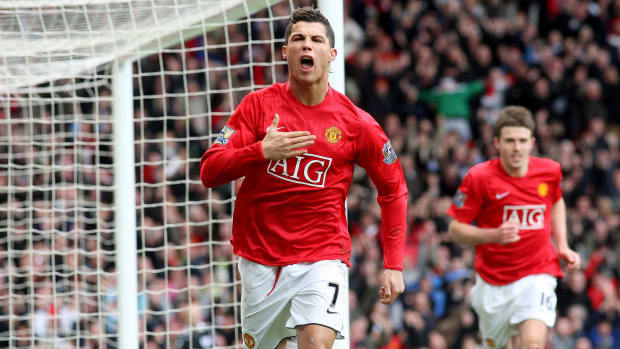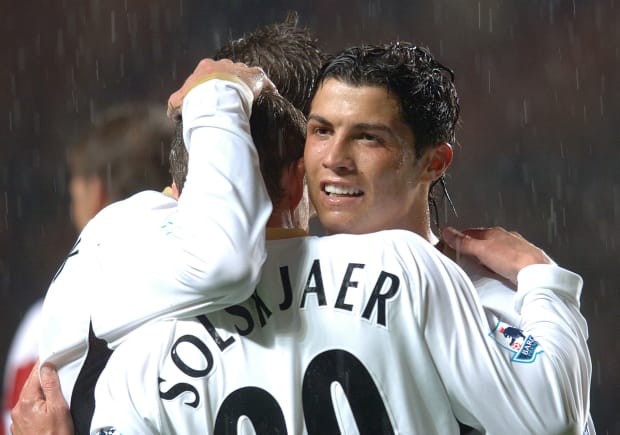The sudden reunion has clearly energized the club's fan base, but is it what the Red Devils truly need to become a more complete side?
“Welcome home, Cristiano,” said Manchester United’s Twitter feed, announcing the return of Cristiano Ronaldo to Old Trafford for a reported fee of €15 million plus €8 million in add-ons (roughly $26 million). Within an hour, that had been liked a million times and retweeted more than 600,000 times. At the next shareholders conference call, CEO Ed Woodward will have some extraordinary social media engagement figures to report.
Of course Man United fans are excited. On Friday morning, they thought one of their all-time icons was going to be playing for their great rival, Manchester City. Instead they can welcome him back as one of their own—and happily forget that he seemed just as happy to pull on the sky blue shirt as Carlos Tevez had been until it transpired that Juventus was adamant about a transfer fee and City dropped its interest. Exactly why City wanted him anyway is a mystery. Ronaldo seems far from a natural fit to play for a Pep Guardiola–coached side.
Ronaldo’s first spell at Man United was one of great success, culminating in three league titles and a Champions League title. The 31 league goals he scored in 2007-08 remain a record for a Premier League season by a United player. Of course fans want to relive those days, particularly given United’s decline essentially began with his departure. But they were a long time ago. It is 12 years since he last played for United. Youri Djorkaeff, who was on the other side when he made his United debut in 2003, is now 53.

PA Images/Sipa USA
Ronaldo has changed and so has football. He is no longer the slender, fleet-footed winger he was on his debut, or even the explosive central striker he was by the time he joined Real Madrid. He has astutely pared back his game, reducing the amount of running he does, becoming a far purer striker. He is arguably still the best attacking header of a ball in the game, and even if he has begun to drop deeper again in the past couple of seasons, his defensive work, never enthusiastic, is now all but non-existent. Among forwards in Europe’s top five leagues, he was in the bottom two percent for pressures made last season.
That is problematic in modern football. Ronaldo remains a formidable goalscorer–81 in Serie A in his last three seasons–but he made Juventus a worse team. After nine successive scudetti, Juve finished fourth in the league last year. Ronaldo was specifically brought in to help Juve win the Champions League, and since then it has won one knockout tie, losing in the quarterfinals to Ajax and then in the last 16 to Lyon and Porto.
There’s no reason to believe the pattern will be any different at United, though the club will certainly hope that it can be. Ronaldo probably will score goals, but then again, that hasn't really been an issue. It scored the second-most goals (73 in 38 games) in the Premier League last season and managed 15 in six Champions League games, but still went out in the group stage. It doesn't need a clinical penalty taker, either. It already has that in Ronaldo's countryman, Bruno Fernandes—who was said to be influential in convincing Ronaldo to join—and it'll be interesting to see how the spot-kick dynamic plays out. Whether he will make it a better side is the real issue. Teams who carry a passenger when it comes to pressing do not usually win the Champions League, as Juve has found, as Paris Saint-Germain has found with Neymar and as Barcelona found with late-period Lionel Messi.
More generally, United’s problem under Ole Gunnar Solskjaer has been in building coherent patterns of attacking play. It is extremely efficient on the break, it has gifted individuals who can turn games, and once ahead it is very adept at playing on the counter. But the lack of structure leads to inconsistency and difficulties with breaking down well-organized defenses. It’s hard to see how Ronaldo changes that.

PA Images/Sipa USA
What United needs is another deep-lying midfielder who can link front and back halves of the side. A mooted bid for Declan Rice had reportedly been delayed because of concerns over financing with $150 million already spent this summer on Jadon Sancho and Raphaël Varane. And yet the purse strings have been opened again for a player United admits was never part of its plans for this season, one who is likely to hinder the development of Mason Greenwood.
It’s a move no less sentimental than appointing Solskjaer who, after two and a half years in the job, remains unconvincing. A figure less steeped in the club would surely have been under serious pressure by now. Ronaldo appeals to the same nostalgic urge. It makes little sense from a football point of view. It’s hard not to feel that United’s chances of progressing are being hampered by the ghosts of glories past.
More Soccer Coverage: